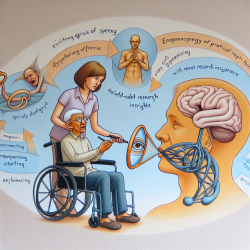As a Special Education Director with a deep commitment to advancing the quality of therapy services provided in our schools, I continually seek out research that offers fresh perspectives and practical strategies to enhance our practice. The compilation of studies presented in "Dysarthria and Apraxia of Speech: Perspective on Management" provides a treasure trove of insights that can significantly impact how we approach speech therapy for these complex disorders. This blog aims to distill key findings from this research and explore how practitioners can integrate these insights into their clinical practice, or be encouraged to delve deeper into the subject.
Understanding Dysarthria and Apraxia of Speech
Dysarthria and Apraxia of Speech are two speech disorders that stem from neurological conditions, affecting an individual's ability to communicate effectively. Dysarthria arises from impairments in the physical production of speech due to muscle weakness, paralysis, or incoordination, while Apraxia of Speech is characterized by difficulty in sequencing the movements required for speech despite the absence of muscle weakness. These conditions not only impact the individual's ability to express themselves but also have profound implications on their social interactions and overall quality of life.
Insights from Recent Research
The selected proceedings from the Clinical Dysarthria Conference, as compiled in the book, highlight the importance of a multifaceted approach to the assessment and management of these speech disorders. Key takeaways include:
- The need for comprehensive assessment tools that go beyond traditional measures and consider the functional impact of speech disorders on daily communication.
- An emphasis on individualized therapy plans that are tailored to the specific needs and abilities of each patient, recognizing the wide variability in how these disorders manifest.
- The potential of technology and innovative therapy techniques, such as computer-based exercises and the use of augmentative and alternative communication (AAC) devices, to enhance speech intelligibility and communication effectiveness.
- A call for interdisciplinary collaboration among speech-language pathologists, educators, neurologists, and other healthcare professionals to provide holistic care to individuals with Dysarthria and Apraxia of Speech.
Practical Applications in Clinical Practice
How can practitioners implement the outcomes of this research into their daily practice? Here are several strategies:
- Adopting a Holistic Assessment Approach: Incorporate tools that evaluate the impact of speech disorders on an individual's functional communication in various contexts, not just the clinical setting.
- Customizing Therapy Plans: Use the insights from comprehensive assessments to develop therapy plans that address the unique challenges and goals of each patient.
- Integrating Technology: Explore the use of software programs and AAC devices as part of the therapy process, especially for patients with severe speech impairments.
- Promoting Interdisciplinary Collaboration: Engage with professionals from various fields to ensure that therapy plans are informed by a broad spectrum of expertise, enhancing the overall care of the individual.
Encouraging Further Research and Professional Development
While the research presented in "Dysarthria and Apraxia of Speech: Perspective on Management" offers valuable insights, it also underscores the need for ongoing exploration in this field. Speech-language pathologists and other professionals working with individuals affected by these disorders are encouraged to:
- Stay abreast of the latest research and clinical guidelines through professional development opportunities, such as conferences, webinars, and continuing education courses.
- Participate in or initiate research projects that explore innovative assessment and intervention strategies for Dysarthria and Apraxia of Speech.
- Contribute to professional discussions and knowledge sharing through publications, presentations, and online forums.
By actively engaging in the continuous cycle of research, application, and evaluation, practitioners can contribute to the advancement of speech therapy practices and ultimately improve the outcomes for individuals with Dysarthria and Apraxia of Speech.
In conclusion, the insights from "Dysarthria and Apraxia of Speech: Perspective on Management" provide a foundation for enhancing speech therapy practices. By understanding the complexities of these disorders, adopting evidence-based strategies, and committing to ongoing professional development, practitioners can make a significant impact on the lives of those they serve. To explore the original research and gain a deeper understanding of these perspectives, please follow this link: Dysarthria and Apraxia of Speech: Perspective on Management.










